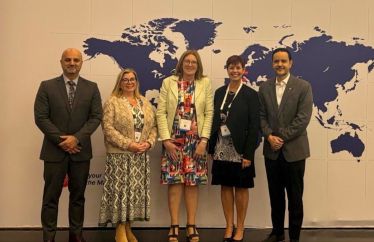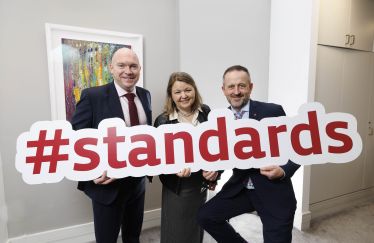NSAI is happy to announce that the European e-Competence Framework for ICT professionals has been formally published as a European Standard. The Framework was officially published on April 6th by CEN, the European Committee for Standardization. It gives organizations, business, and ICT practitioners in Europe a common language to describe digital competencies and proficiency levels.
The implementation of this standard will allow ICT skills and competences to be adequately tracked on the European stage. This will allow organizations to identify skills gaps in various roles within ICT and develop training and development plans to fill them.
NSAI, through the Irish Computer Society (ICS), has been involved in the development of the e-CF from the start, and ICS Fellow, Dudley Dolan, is Chairman of the CEN Workshop on ICT Skills that developed the Framework. The process of creating the standard was the responsibility of CEN Technical Committee 428, to which Mr. Dolan headed the Irish delegation, which also included Mary Cleary, Deputy CEO of ICS. A formal TC 428 mirror committee under NSAI/ICTSCC, NSAI/ICTSCC/SC 13, provided expert guidance and advice to the delegation during the transition period.
An overview of the new standard will be delivered at the IT Professionals Day event at ICS on Monday, 25th April.
Press Release excerpt via CEPIS (Council of European Professional Informatics Societies)
CEPIS Secretary General, Fiona Fanning, said: "Organizations must be able to understand the core areas of ICT expertise required by different roles, in order to recruit and develop suitable employees, and maintain adequate levels of competences. The e-CF is the ideal tool to support organizations in doing so. It will help tackle Europe’s alarming ICT skills gap. Previously, there was no way to express ICT competences and skills requirements and gaps on a European level."
The e-CF was designed to provide clear definitions to support decision-making with regard to the selection and recruitment of candidates as well as the training and assessment of ICT professionals. Employers can adopt it to establish profiles and career development paths for ICT professionals. The definition of career streams will offer valuable insight into potential career opportunities. A large company could, for example, use the e-CF to develop a tool to manage the process of training identification. The e-CF would serve as a consistent benchmark of competences to assess training programmes addressing individual development needs.
The e-CF was developed under the umbrella of the CEN Workshop on ICT Skills, through a process of collaboration between experts and stakeholders from across Europe. The national standards bodies of the 33 CEN-CENELEC members will now begin implementing it at national level, commencing in Ireland adoption as an Irish Standard by NSAI.
The e-CF will be on the agenda at the IT Professionalism Europe conference, to be hosted by CEPIS on 16 June 2016, in Amsterdam. The first conference of its kind, it will seek to catalyse the professionalization of IT personnel and showcase best practice in managing, developing and assessing IT staff in Europe. Delegates will learn how to use the e-CF and similar tools and how to apply them in their respective companies, as well as meet with organisations that provide tools and services, such as competence assessment and certification providers.
IT Professionals Day
On April 25th, the Irish Computer Society will be hosting IT Professionals Day, a dedicated day to celebrate the role and contribution that IT Professionals have in advancing business and society across Europe. Among the speakers will be Andre Richier, Principal Administrator with the European Commission, and Dudley Dolan, FICS, TCD, who will be speaking on the implementation of the e-Competence Framework and its consequences with the IT Profession.
ICS is encouraging IT professionals across Europe to adopt the 'Three Cs':
- Commit to the IT Professionals Code of Conduct,
- Connect with fellow professionals through continuous professional development, and
- Contribute their time or use their skills to support their society or profession.
During IT Professionals Day, the European Commission will also be launching a new survey to capture the needs of IT Professionals.
Participation in e-CF standardization
Interest in participation in e-CF standardization work through NSAI.ICTSCC/SC 13 can be registered through NSAI Get Involved and the standard procured at Standards.ie.
Further details of the work are available from Dr. Ian Cowan, NSAI



